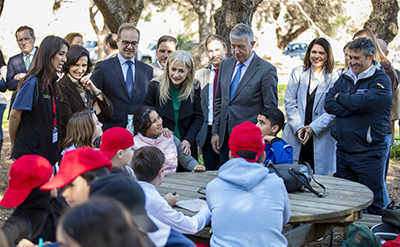- In the context of World Wetlands Day, Fundación Cepsa, along with Education Minister of the Andalusian Government Patricia del Pozo, territorial delegate Jose Correa, and mayor of Palos de la Frontera Carmelo Romero, presented a new network of early fire detection sensors
- As part of the day, 125 children from two Andalusian schools participated in the 23rd edition of World Wetlands Day celebrated by Fundación Cepsa
This 23rd edition, which was celebrated under the motto “Wetlands and human well-being,” was opened by 125 elementary school students from San Jorge and Hermanos Pinzón schools, from the municipality of Palos de la Frontera. Over the course of the week, more than 350 students from across the province will participate in environmental education workshops near the lake. The workshops, which are play-based, are aimed at better understanding the carbon absorption processes that make wetlands a key element in the fight against climate change.
The event was also attended by the general director of Fundación Cepsa, Teresa Mañueco, the Education Minister of the Andalusian Government, Patricia del Pozo, the territorial delegate, Jose Correa, the mayor of Palos de la Frontera, Carmelo Romero, Vodafone’s director of global affairs, Hugo Barbosa, and the director of Cepsa's La Rábida Energy Park, Jorge Acitores.
Cepsa and its Foundation promoted and carried out a restoration project in this ecosystem 23 years ago in collaboration with the Andalusian Government, an environmental milestone that aimed to prevent, stop, and reverse the degradation of this ecosystem, which is visited by a total of 152 bird species, of which 61 are endangered.
This project achieved a comprehensive restoration from a triple perspective: ecological recovery, landscape restoration, and environmental awareness, which will allow for the future conservation of the area.
“Today is a day to give voice to wetlands, for awareness, respect, and action.” Wetlands capture CO2, store more carbon than any other ecosystem, and help us mitigate climate change and its effects. Thus, Andalusian wetlands are strategic. With the experience of Primera de Palos Lake, a reference in wetland restoration and conservation on the Iberian Peninsula, at Fundación Cepsa we want to contribute to the preservation of these spaces,” declared Teresa Mañueco, vice president of Fundación Cepsa. “These ecosystems act as carbon sinks, and are able to capture and store between 20 and 30 percent more carbon than terrestrial ecosystems, and therefore actions to improve their ecological condition are of enormous relevance,” she added.
Minister Patricia del Pozo highlighted the importance of education to raise awareness among students about such relevant issues as the impact of climate change on the natural and social environment, conserving and improving diversity, and the sustainable and responsible use of water. She has thanked Fundación Cepsa for their collaboration in this area, especially in early ages, through their program with schools in Huelva.
In addition, on the occasion of World Wetlands Day, Fundación Cepsa presented a novel IoT sensor system for early detection of forest fires in the Primera de Palos Lake.
Thus, this ecosystem now has innovative technology, provided with the support of Vodafone, to protect the region's natural resources, reduce carbon emissions, and collect data and analysis for the preservation of natural spaces.
World Wetlands Day
World Wetlands Day, celebrated since 1977 to commemorate the signing of the Ramsar Convention on Wetlands (Iran), is one of the most important educational opportunities of the year for Fundación Cepsa.
Wetlands are ecosystems with abundant biological diversity, regulators of the water cycle and climate, generators of water resources, and offer areas for human activities such as tourism and fishing. Primera de Palos Lake is a clear example of such a space.
The wetland, located near the company's facilities in Palos de la Frontera and part of the Natural Area of Lagunas de Palos y Las Madres, belongs to the Natura 2000 Network and was declared a Wetland of International Importance (Ramsar Site) in 2006. This international agreement promotes the conservation and rational use of these spaces and is the only global treaty that focuses on a single ecosystem.

